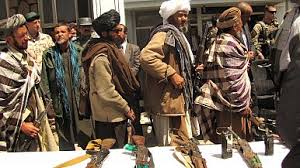
The deal sheds light on China’s increasing importance in Afghanistan and Pakistan, with its involvement in efforts to end the war with Taliban, who have been fighting since 2001 to re-establish Islamist rule in Afghanistan.
Hopes for a peace process were raised on Thursday when Pakistani and Afghan officials said members of the Taliban leadership had signaled they were willing to begin talks as soon as next month.
The apparent Taliban change of position was said to have been made under pressure from Pakistan, although the official Taliban spokesman denied any move toward negotiations with the Afghan government.
Pakistan has been under pressure from China, which is concerned about Islamists among its Muslim minority, to step up pressure against militants. Three senior Afghan police and intelligence officials described the operation last month to capture ethnic Uighur militants, members of a separatist movement opposed to Beijing’s rule over the Xinjiang region, which is home to the Turkic-speaking, mostly Muslim Uighurs.
“We offered our hand in cooperation with China and in return we asked them to pressure Pakistan to stop supporting the Taliban or at least bring them to the negotiating table,” said one of the security officials, who attended a meeting with Chinese officials to arrange transfer of the prisoners.
Chinese officials in Beijing and at the embassy in Kabul did not respond to requests for comment.
The Uighurs, who the Afghan officials said had trained in militant camps across the border in Pakistan, were handed over to Chinese officials last month.
A second security official said a total of 15 Uighurs were arrested – three in the capital, Kabul, and 12 later in the eastern province of Kunar bordering Pakistan.
They had been in contact with al Qaeda and other militants operating in Pakistan, according to a member of Afghanistan’s intelligence agency.
A Pakistani Taliban commander in the border area said by telephone that a group of Uighurs had been based in the Pakistani border region of North Waziristan but left when the Pakistani army launched an offensive there last year.
“They have shifted to Afghanistan,” he said.
‘PLAYING ITS ROLE’
China has increasingly been concerned about activists from Xinjiang getting militant training in Pakistan. It says Uighur militants were behind attacks in Xinjiang and other parts of the country in recent years in which hundreds have been killed.
Exiled Uighur groups and human rights activists, however, say repressive government policies in Xinjiang, including controls on Islam and on Uighur culture, have provoked unrest.
China’s concerns have led it to engage in the so far fruitless effort to negotiate an end to the Afghan war, said Barnett Rubin, a former State Department official who is now a senior fellow at the Center on International Cooperation.
In particular, China is believed to have used its influence with Pakistan to persuade it that it was not in Pakistan’s interests to turn a blind eye to the Afghan Taliban and other militants operating along its border.
“Pakistan’s attitude to militant groups fighting in Afghanistan has evolved … China has played a role in Pakistan’s evolution because China is very concerned about militants from Xinjiang province receiving training in Pakistan,” Rubin said.
China is likely to have played a significant role in moves toward starting talks with the Taliban, he said.
“I’m sure they have weighed in quite decisively, quietly.”
Pakistan is seen as having other reasons for pushing the Afghan Taliban to talk to Kabul, in particular the hope of Afghan help in tackling Pakistani Taliban hiding in east Afghanistan and launching attacks in Pakistan, including the massacre of 153 people at an army-run school in December.
Pakistan has long seen the Afghan Taliban as a tool if old rival India were to become too influential in a hostile Afghanistan.
But Afghan President Ashraf Ghani, who took office last year, has made improving relations with both Pakistan and China a cornerstone of his administration.
Ghani’s first foreign visit was to Beijing in October when he assured Chinese President Xi Jinping of Afghanistan’s help in fighting militants.
Last week in Pakistan, visiting Chinese Foreign Minister Wang Yi said China would help mediate in efforts to engage the Afghan Taliban in negotiations.
A week later, Pakistan’s powerful army chief visited Afghanistan with a message for Ghani that Taliban leaders had signaled they were open to talks.
It is not clear how significant Afghanistan’s arrest of the Uighurs was in the push for negotiations. A Pakistani military officer said China was “playing its role” in the effort.
Pakistani Foreign Office spokeswoman Tasnim Aslam said it was unfair to suggest that China or any other outsider was behind Pakistan’s involvement in pushing for talks.
“Peace and stability in Afghanistan are in Pakistan’s interest,” she said.
(Additional reporting by Katharine Houreld and Mehreen Zahra-Malik in Islamabad and Saud Mehsud in Dera Ismail Khan, Pakistan; Writing by Kay Johnson; Editing by Robert Birsel)

